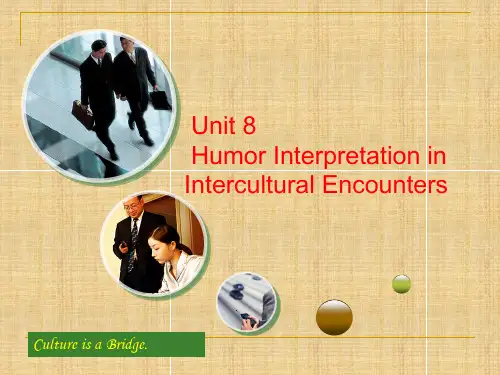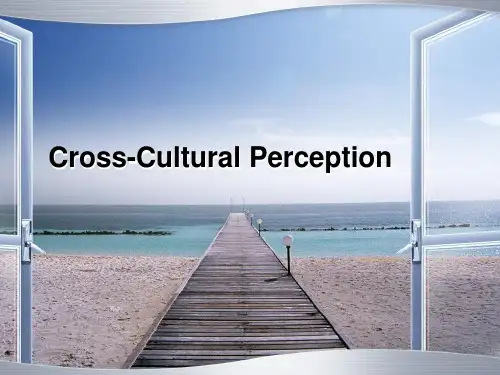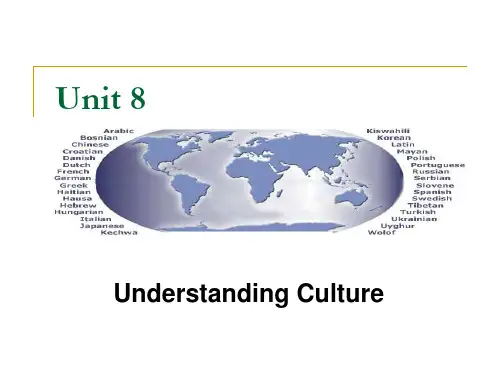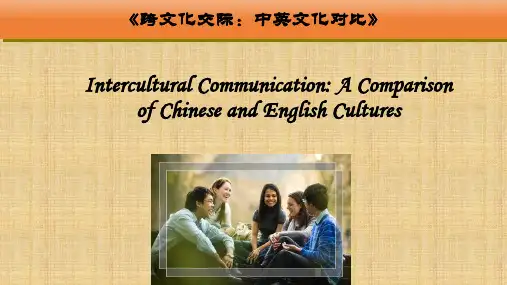跨文化交际实用教程 unit 8.
跨文化交际实用教程 unit 8

Humor
Failure to understand humor is a common occurrence.
“You are also human” A compliment in America, but cause embarrassment in China.
Chapter 1: Humor as a Pathway to Intercultural Communication Competence
Elements that may hinder our understanding of English humor
Vocabulary “Quid” is the modern word for what was once called a "shilling”. friends are called “tossers”. If you are fond of someone, you should tell him he is a “great tosser” -- he will be touched.
Humor goes beyond language. Learning how to explain humor and how to ask questions about humor is important for intercultural communication. A two-stage process is involved in sharing humor between native and non-native speakers.
1.Abandon the old conversational rule:
文化与跨文化交际——大学英语视听说 教学课件Unit 8_

Watch the movie clip again and answer the following questions based on it.
4. When Datong says, “Just go ahead. So far, you've asked one question”, he implies that _____________
A. Ms Marin has not tried her best to defend him
7. According to the CWA lawyer, Sun Wukong did the following things EXCEPT_________
A. appropriate others’ harvest for himself
B. destroy some poor farmers’ orchard
2) Have you ever experienced a similar situation when you tried to make a point by telling a story, but your listener reached a very different conclusion based on your story? If yes, what was your story like?
Unit Eight: Telling and Interpreting Stories
English Language Center Shantou University
跨文化交际(UNIT 8)英文 PPT

Review of Unit 7
1. What is M-Time and P-Time? Which do you think is the dominating time system in our culture?
2. What is the right way of dealing with issues of space and privacy in an intercultural environment?
➢ It occurs when our nation is seen as the of the world.
➢ In other words, it refers to our tendency to identify with our ingroup and to evaluate outgroups and their members according to its standard.
Idioms which are culturally loaded include:
Belgian hare, Dutch barn, French letter, German measles, Greek gifts and Swedish drill.
French Leave and Dutch Courage (p265-267)
➢ Ethnocentrism often is expressed in the way people draw their maps. People tend to draw maps of the world with their own country at the center and with other parts of the world depicted as peripheral.
跨文化交际UNIT 8

Belgian hare, Dutch barn, French letter, German measles, Greek gifts and Swedish drill.
French Leave and Dutch Courage (p265-267)
? Many idioms concerning other nations suggest that the British's used to hold others in derision and contempt. But all those related to the British themselves indicate that the British used to view themselves in positive ways.
Intercultural Communication Unit 8
Cross-Cultural Perception
Warm Up
Please read the story on page 264 and fill in the blanks. What do you think of the story?
French Leave and Dutch
Courage (p265-267)
? Do you know some terms and expressions in English that are formed with names of other nationalities?
For instance, idioms which are culturally neutral include: Danish pastry, Flemish bond, Irish stew, Italic handwriting, Portuguese man-or-war, Russian roulette, Spanish fly, Scotch pine, Swiss roll, Turkish delight and Welsh rarebit.
跨文化交际Unit 8(大二英语)

I. What is Culture?
Culture is everything. Culture is opera, art, and ballet. Culture may be defined as what a society does and thinks. What really binds men together is their culture. A culture is a collections of beliefs, habits, living patterns and behaviors which are held more or less in common by people who occupy particular geographic areas.
Greek Culture
Egyptian Culture
Babylon Culture
Chinese Culture
From Anthropological Perspective
Culture is “the customs, civilizations, and achievements of a particular time or people”. This is an anthropologist’s definition.
II. Three Ingredients of Culture
Beliefs & value systems
Material objects
Behavior patterns
Culture
Case Study???
It was my first visit to Chongqing. I felt uneasy when I asked the way to some place. In my hometown in the North, directions are given in terms of East, West, North and South. We may easily find the way when local people there tell you whether the place is in the direction of North or South; while in Chongqing the local people tell you the way in terms of direction on the right, or on the left, to which we Northerners are quite unfamiliar.
跨文化交际中英文化对比教学课件Unit 8 Traffic and transport

Text study: Passage 1 Transport in China (P. 197)
The first metro system in China began operation in Beijing in 1971 and the Tianjin Metro followed in 1984. The rapid growth of China’s economy since the late 1980s has created a surge ([sɜːdʒ] 激增) in
Section A Traffic and Transport in China
New Words & Expressions in Passage 1
expansion [ɪk'spænʃn] n. 膨胀;扩展;扩充 comprehensive [ˌkɑːmprɪ'hensɪv] adj. 全面的;广泛的;综合的;理解的 civil ['sɪvl] adj. 公民的;文明的;国内的;民用的;民事的 aviation [ˌeɪvi'eɪʃn] n. 航空;飞机制造业civil aviation民用航空 express [ɪk'spres] n. 快车;快递;专使adj. 明确的;急速的;直接的vt. 表达;表示; 挤压出;快递express highways高速公路 expressway 高速公路 electrified [ɪ'lektrɪfaɪd] adj. 电气化的 metro ['metroʊ] n. 地铁 rapid ['ræpɪd] adj. 短时间发生的;急速的;迅速的;快的;险峻的 exceed [ɪk'siːd] v. 超过;超出 project ['prɑːdʒekt] n. 计划;工程;项目;课题v. 计划;预计;设计;放映;投射 subway ['sʌbweɪ] n. 地铁;地下通道 surge [sɜː(r)dʒ] v.浪涌;激增;汹涌;涌动n. 激增;突发;大量;一大批 urban ['ɜː(r)bən]adj.城市的;都市的;城镇的;都市音乐的 prompt [prɑːmpt] adj. 迅速的;敏捷的;立刻的vt. 激起;促进;推动;提示 in operation在运转;生效;在运行 construction [kən'strʌkʃn] n. 施工;建筑;建立;建造under construction在建设中;施工中
跨文化交际(UNIT 8) ppt课件
“I told the Englishman it was the 1 sporting thing to do,
and he jumped. I told the Frenchman it was 2 chic; the
German that it was a 3 command; the Italian that it was
Danish pastry, Flemish bond, Irish stew, Italic handwriting, Portuguese man-or-war, Russian roulette, Spanish fly, Scotch pine, Swiss roll, Turkish delight and Welsh rarebit;
Idioms which are culturally loaded include:
Belgian hare, Dutch barn, French letter, German measles, Greek gifts and Swedish drill.
PPT课件
5
French Leave and Dutch Courage (p265-267)
4 forbidden; the Russian that it was 5 revolutionary; so
they all jumped overboard.”
“And how did you get the American to jid the captain, “I told him he was 6
Danish pastry, Flemish bond, Irish stew, Italic handwriting, Portuguese man-or-war, Russian roulette, Spanish fly, Scotch pine, Swiss roll, Turkish delight and Welsh rarebit.
新编跨文化交际英语教程_参考答案Unit
Unit 3Cultural DiversityReading IDifferent Lands, Different FriendshipsComprehension questions1. Why is it comparatively easy to make friends in the United States Because few Americans stay put for a lifetime. With each move, forming new friendship becomes a necessity and part of their new life.2. Do people from different countries usually have different expectationsabout what constitutes friendship and how it comes into beingYes. The difficulty when strangers from two countries meet is their different expectations about what constitutes friendship and how it comes into being.3. How is friendship in America different from friendship in West Europe In West Europe, friendship is quite sharply distinguished from other, more casual relationships, is usually more particularized and carries a heavier burden of commitment, while in America the word “friend” can be applied to a wide range of relationship and a friendship may be superficial, casual, situational or deep and enduring.4. In what countr y does friendship have much to do with one’s family And in what country does it notIn Germany, friendship has much to do with one‘s family as friends are usually brought into the family, while in France it doesn’t as, for instance, two men may have been friends for a long time without knowing each other‘s personal life.5. What is friendship like when it is compartmentalizedFor instance, a man may play chess with a friend for thirty years without knowing his political opinions, or he may talk politics with him for as long a time without knowing about his personal life. Different friends fill different niches in each person’s life.6. What are friendships usually based on in EnglandEnglish friendships are based on shared activity. Activities at different stages of life may be of very different kinds. In the midst of the activity, whatever it may be, people fall into steps and find that they participate in the activity with the same easy anticipation of what each will do day by day or in some critical situation.7. Do you think friendship shares some common elements in different cultures If you do, what are theyYes. There is the recognition that friendship, in contrast with kinship, invokes freedom of choice. A friend is someone who chooses and is chosen. Related to this is the sense each friend gives the other of being a special individual, on whatever grounds this recognition is based. And between friends there is inevitably a kind of equality of give-and-take.8. What do you think is the typical Chinese concept of friendship Is it similar to or different from any of the Western friendshipsIt seems that the typical Chinese concept of friendship lays great emphasis on personal loyalty and also has much to do with family. It may be similar to Germany friendship to some extent and quite different from other Western friendships.Reading IIComparing and Contrasting CulturesComprehension questions1. How is the mainstream American culture different from the Japanese cultureAmericans believe that human nature is basically good and man is the master of nature. They are future-oriented and “being”-oriented. Their social orientation is toward the importance of the individual and the equality of all people. However, the Japanese believe that human nature is a mixture of good and evil. Man is in harmony with nature. They are both past-oriented and future-oriented. And they are both “growing-”and “doing-”oriented. They give emphasis to authorities and the group.2. Can you find examples to support the author’s view of traditional cultures in different value orientationsFor example, the traditional Indian culture believes that man is subjugated by nature and it is being-oriented (which can be exemplified by its caste system). Also, traditional Chinese culture is past-oriented, for emphasis has long been given to learning from the old and past.3. Why do Americans tend to equate “change” with “improvement” and regard rapid change as normalConcerning orientation toward time, Americans are dominated by a belief in progress. They are future-oriented. They believe that “time is money”and have an optimistic faith in the future and what the future will bring. So they tend to equate “change” with “improvement” and consider a rapid rate of change as normal.4. What does “Electric Englishman” mean when it is used to describe the AmericanAs for activity, Americans are so action-oriented that they tend to behyperactive. That’s why that they have been described as “Electric Englishmen”, who always keep themselves busy.5. How would you explain the fact that contradictory values may exist in the same cultureAs time changes faster and faster and there is more contact between cultures, it is more likely to find contradictory values existing in the same culture. This is especially the case in a society that is being transformed from a traditional one into a modern one. For example, in the Japanese culture, some people may still be very past-oriented and some are rather future-oriented, and even the same people may be sometimes past-oriented in certain situations and sometime future-oriented in other situations.6. What can we get from models of this kind about cultural differences Models of this kind are quite useful in giving rough pictures of striking contrasts and differences of different cultures. However, such a model only compares cultures on some basic orientations. It does not tell us everything about every conceivable culture. We have to recognize that models of this kind are over-simplifications and can only give approximations of reality.7. Do cultural values change as time changesYes, the values may be in the process of marked change due to rapid modernization and globalization. However, they have a way of persisting in spite of change. The evolution of values is a slow process, since they are rooted in survival needs and passed on from generation to generation.8. How is communication influenced by differing cultural valuesPutting people from one culture into another culture with radically different value orientations could cause stress, disorientation, and breakdowns in communication.Case StudyCase 9Hierarchy is significant in the Japanese culture. This structure is reflected everywhere in Japanese life, at home, school, community, organizations, and traditional institutions such as martial arts or flower arrangements.In this case, the young chairman must have had his own ideas about how to manage the company; however, when encountered with his grandfather’s dissenting opinions, he dared not to take a stand against him. This may manifest the rigid hierarchicalstructure in the Japanese society. In the Japanese society, how hierarchy is formed depends mainly on seniority, social roles, and gender. As a respectable senior member of the family and the former leader of the company, the grandfather obviously overpowered the inexperienced young chairman. In other words, the grandfather seemed to be an absolute authority for the young chairman. In Japanese culture, challenging or disagreeing with elders’ opinions would be deemed as being disrespectful and is often condemned. People in lower positions are expected to be loyal and obedient to authority. That‘s why the young chairman didn’t say anything but just nodded and agreed with his grandfather.But Phil seemed to know little about the Japanese culture in this aspect. In many Western cultures, particularly American culture, seniority seldom matters very much in such situations, and young people are usually encouraged to challenge authority and voice their own opinions. Unfortunately, his outspoken protest could easily offend the grandfather and he might be regarded as a rude and ill-bred person by other Japanese.Case 10In Japan, a company is often very much like a big family, in which the manger(s) will take good care of the employees and the employees are expected to devote themselves to the development of the company and, if it is necessary, to sacrifice their own individual interests for the interests of the company, from which, in the long run, the employees will benefit greatly. But for the French, a company is just a loosely- knit social organization wherein individuals are supposed to take care of themselves and their families. Moreover, the way the French make decisions in the family might also be different from the typical Japanese one, which may not often involve females and the power to decide usually lies with the dominating male. As there are such cultural differences between the Japanese and the French, Mr. Legrand’s de cision made Mr. Tanaka feel dumbfounded.Case 11Incidents such as these can point to possible cultural differences in so-called “polite” behavior, and at the same time highlight the tendency for people to react emotionally to unexpected behavior.People in most cultures would probably agree that an apology is needed when an offence or violation of social norms has taken place. However, there may be differing opinions as to when we should apologize (what situations call for an apology) and how we should apologize. To many Westerners, Japanese apologize more frequently and an apology in Japanese does not necessarily mean that the person is acknowledging a fault. To many Japanese, Westerners may seem to be rude just because they do not apologize as often as the Japanese would do. In this case, for instance, the attitude of the Australian student’s parents is shocking to the Japanese but will be acceptable in an English-speaking society, for the student is already an adult and can be responsible for her own deeds.Case 12In this case, it seems that the Chinese expectations were not fulfilled. First, having two people sharing host responsibilities could be somewhat confusing to the hierarchically minded Chinese. Second, because age is often viewed as an indication of seniority, the Chinese might have considered the youth of their Canadian hosts as slight to their own status. Third, in China, it is traditional for the host to offer a welcome toast at the beginning of the meal, which is the reciprocated by the guests; by not doing so, the Canadian might be thought rude. The abrupt departure of the Chinese following the banquet was probably an indication that they were not pleased with the way they were treated. The Canadians’ lack of understanding of the Chinese culture and the Chinese ways of communication clearly cost them in their business dealings with the visiting delegation.。
完整word版跨文化交际实用教程胡超版U1 U8判断题答案及翻译
T 1 As a phenomenon, intercultural communication has existed for thousands of years. However, as a discipline, itshistory is only about fifty years.作为一种现象,跨文化交际已经存在了几千年。
然而,作为一门学科,它的历史只有50年左右。
F 2 Intercultural Communication as a discipline first started in Europe.跨文化交际作为一门学科最早起源于欧洲。
F 3 Culture is a static entity while communication is a dynamic process. 文化是一个静态的实体,交流是一个动态的过程。
T4 Culture can be seen as shared knowledge ,what people need to know in order to act appropriately in a given culture.文化可以看作是共享的知识,人们需要知道什么才能在特定的文化中采取适当的行动。
T5 Although cultural stereotype has its limitations (over-generalization),it still contributes to a person 's cultural cognition.虽然文化刻板印象有其局限性(过度概括),但它仍然有助于一个人的文化认知。
T 6 In intercultural communication, we should separate one 's individual character from cultural generalization.在跨文化交际中,我们应该把一个人的个性与文化泛化区分开来。
跨文化交际实用教程(全套课件266P)
2012-2-16
6
The western way of showing concern is generally different from the Chinese way.
In China:
Xiao Li (an interpreter): You must be very tired. You’rห้องสมุดไป่ตู้ old…
2012-2-16
4
Comment
What the interpreter said is quite courteous in China. It means, ―If you are tired, we can take a little rest, since you are getting on in years.‖
This
case clearly shows that translation is an intercultural communication, which requires the translator/ interpreter to possess both English cultural knowledge and language competence.
1. 17 speak Chinese
2. 9 speak English
3. 8 speak Dard
The interpreter gave the impression that he thought the elderly lady would collapse any minute if she doesn’t rest immediately.
2012-2-16
- 1、下载文档前请自行甄别文档内容的完整性,平台不提供额外的编辑、内容补充、找答案等附加服务。
- 2、"仅部分预览"的文档,不可在线预览部分如存在完整性等问题,可反馈申请退款(可完整预览的文档不适用该条件!)。
- 3、如文档侵犯您的权益,请联系客服反馈,我们会尽快为您处理(人工客服工作时间:9:00-18:30)。
Elements that may hinder our understanding of English humor
Vocabulary “Quid” is the modern word for what was once called a "shilling”. friends are called “tossers”. If you are fond of someone, you should tell him he is a “great tosser” -- he will be touched.
Humor goes beyond language. Learning how to explain humor and how to ask questions about humor is important for intercultural communication. A two-stage process is involved in sharing humor between native and non-native speakers.
United Nations Survey
Last month, a world survey was conducted by the UN. The only question asked was: "Would you please give your honest opinion about solutions to the food shortage in the rest of the world." The survey was a huge failure... In Africa they didn't know what "food" meant. In Eastern Europe they didn't know what "honest" meant. In Western Europe they didn't know what "shortage" meant. In China they didn't know what "opinion" meant. In the Middle East they didn't know what "solution" meant. In South America they didn't know what "please" meant, and In the USA they didn't know what "the rest of the world" meant.
Unit 8 Humor Interpretation in Intercultural Encounters
Culture is a Bridge.
English gas station
All Greek to me: Meaningless and incomprehensible like someone who cannot read, speak, or understand any of the Greek language would be. All In The Same Boat: When everyone is facing the same challenges. An Arm And A Leg: Very expensive. A large amount of money.
英格兰人谈论苏格兰人和爱尔兰人的3则笑话:
1.一个爱尔兰人给旅游公司打电话:“我坐飞机到伦敦将用多 长时间?”办事员想看看飞机时刻表,对他说:“(请等)一分钟, 先生!”“非常感谢!”爱尔兰人满意地答道并挂上了电话。
2.一个苏格兰人从英格兰回到了家。家人问道:“在伦敦怎么 样?”苏格兰人答道:“还行!就是那些英格兰人很奇怪。我住在 旅馆时,他们像疯子一样在我隔壁敲了一夜墙。”“那你当时干什 么呢?”“我没干什么!我只是吹了一夜笛子!”房间。爱尔兰人生气地说:“看着点儿!别以为我 来自爱尔兰,就让我住进这么个小房间!”服务生连忙解释道: “别生气,先生!这是电梯。”
English gas station
A Taste Of Your Own Medicine: When you are mistreated the same way you mistreat others.
Beat A Dead Horse: To force an issue that has already ended. Beating Around The Bush: Avoiding the main topic. Not speaking directly about the issue.
Humor
Failure to understand humor is a common occurrence.
“You are also human” A compliment in America, but cause embarrassment in China.
Chapter 1: Humor as a Pathway to Intercultural Communication Competence
Stage 1: making new conversational rules.
There are many reasons why it is hard to explain humor. vocabulary sayings and idioms background knowledge some stereotyped images
Sayings and idioms as close as an oyster 嘴很紧 polish the apple 讨人欢心; 拍马屁
